Vaping Guide for Beginners
QUICK LINK
Step 2: Find Your E-Liquid
Step 3: Choose Your Vape Kit
Step 4: Learn How to Use Your Vaping Device
Step 5: Time to Get Started!
Thinking about stepping into the world of vaping but not sure where to begin? Fear not! This step-by-step vape guide for beginners offers you all of the vital information you need to get started, with handy tips and answers to all of your vaping questions.
Step 1: Learn the Basics
What Parts Make Up a Vape?
A vaping device consists of a heating element and wicking material (the coil), an e-liquid tank, a battery, and a mouthpiece for inhaling. You'll find various kinds of vaping devices on the market, all ranging in size, style, and format.
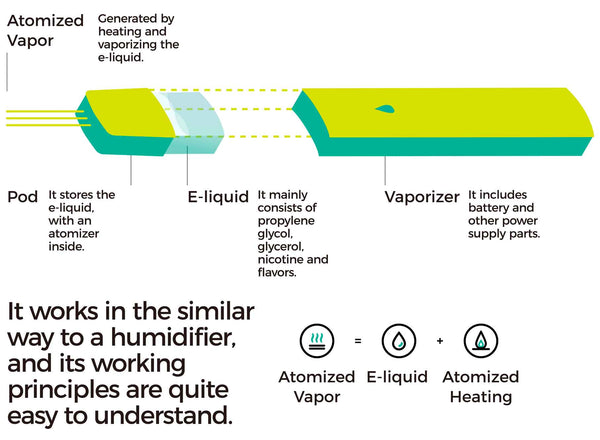
The Components of Vape Pen
The majority of vapes available have the same essential components. These are:
- Battery: The battery provides power to your vape. The bulkiest part of a vaping device holds all of the power and electronics required to heat the coil and turn the e-liquid to vapor.
- Coil: The coil consists of metal wire, usually surrounded by cotton wicking. The coil's function is to absorb the e-liquid, heat it, and turn it into vapor for you to inhale when you press the button. Coils need replacement when you start to get a burnt taste as you inhale. The refill time could be anywhere from a couple of days to a week or two.
- Pod: The pod is the glass or plastic casing in which the coil sits. It is where you place the e-liquid so that it can come into contact with the coil.
- Mouthpiece: This is the part from which you inhale the vapor.
More information about how does a vape pen work.
Step 2: Find Your E-Liquid
What Is E-Liquid?
E-liquid, also known as e-juice or vape juice, is a fluid that comes in small bottles to add to your vape. You place it in the tank, where it gets heated to create the vapor that you inhale. E-liquid contains:
- Propylene Glycol (PG)
- Glycerin (VG)
- Nicotine (but not necessarily!)
- Food-grade flavoring
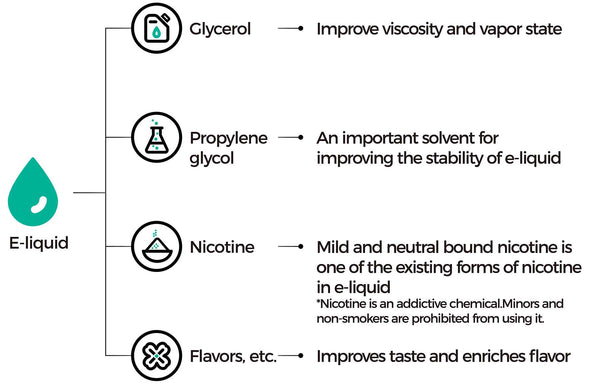
Component of E-liquid
Propylene glycol (PG) is the ingredient in e-liquid that carries the flavor. The higher PG content liquids are easier to vaporize (due to its thin consistency), so they are best-suited for vaping beginners. The PG liquid provides the throat-hit when you inhale, in a similar way to smoking a cigarette.
Glycerin (VG) creates the vapor clouds that you exhale from the vape. It is a sweeter liquid and much thicker in consistency. Higher VG content e-liquids are much smoother to vape, and they don't give the same sensation as smoking. They also produce much bigger vapor clouds.
Which E-Liquid Is Right for Me?
When you shop for e-liquids, you'll find a massive array of options, including a vast range in PG/VG ratios and a full selection of flavors. Many e-liquids have added nicotine, so it's often so easy for smokers to switch from cigarettes to vaping.
To choose the right e-liquid, you'll want to consider the effects of different ratios of PG/VG and whether or not you want any nicotine content. We cover these crucial aspects in the next section of the vape guide.
Choosing PG/VG
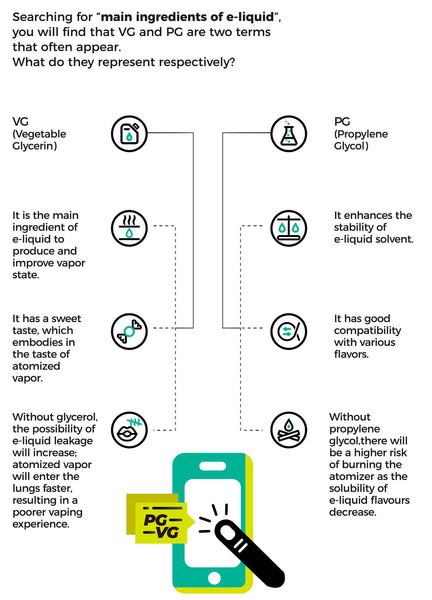
Basic Information About VG and PG
Even PG/VG ratios (50/50) are well-suited to people who need a high level of nicotine in their vape—those who have recently made the switch from smoking, for example. These levels work well with standard vape pens.
Choosing Nicotine Content
It's crucial to get the nicotine level in your e-liquid right, mainly if you are replacing smoking with vaping.
When shopping for e-liquids, you'll see the nicotine content written on the bottle in milligrams (mg). This measurement indicates the amount of nicotine you get in each milliliter (ml) of e-liquid.
Heavy smokers (e.g., more than one pack a day) may require a high nicotine level e-liquid when they start vaping.
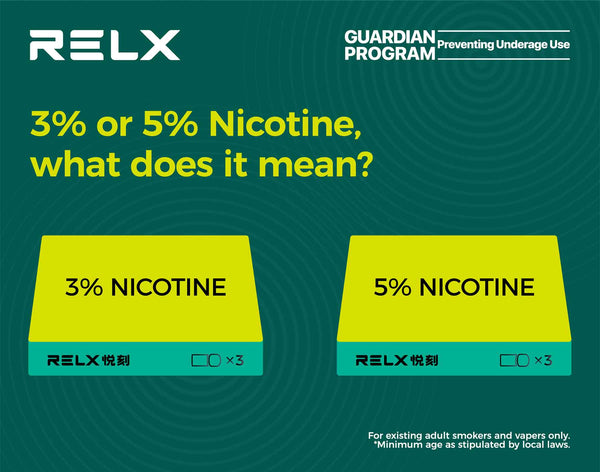
Nicotine Content: 3% and 5%
Meanwhile, for light smokers who only smoked a few cigarettes a day, they should start on an e-liquid with a lower strength of around 3mg.
Of course, there are many different types of concentrations between these two extremes. You can base the strength on the amount you usually smoke.
If you are starting vaping to give up smoking, you can gradually reduce your nicotine levels and ultimately become non-dependent on nicotine.
Step 3: Choose Your Vape Kit
There is a vast market of vape kits, and this vape guide only skims the surface. Check out our other resources and reviews to find the best ones for you.
CE4 Kit
Many vaping beginners start with a CE4 kit. They are one of the cheapest options on the market, easy to set up, and straightforward to use.
These kinds of vaping devices are best suited to e-liquids with a 50/50 PG/VG balance, as this creates less vapor.
However, as vape pens are now widely available and more affordable, CE4 kits are becoming less common.
Vape Pen
Vape pens are hugely popular for beginners as well. They offer many improvements over the CE4 devices but are still affordable.

RELX Classic Vape Pen
The main difference lies in the coils, which are of better quality and offer lower resistance to CE4 devices. This design offers a bigger hit and improved flavor. You can use vape pens with higher VG content e-liquids.
Mod & Tank
Mod kits tend to be the preferred option for the more experienced vaper. There is a whole range of designs of mods and tanks available, with options to adjust the temperature, ventilation, and wattage.
These kinds of vaping devices are larger and heavier than vape pens but have significantly increased power and battery life. They offer a customized vaping experience and are useful for both low and high VG e-liquids.
Step 4: Learn How to Use Your Vaping Device
There are two main methods of inhaling when it comes to using your vape. Do remember that vaping won't be precisely the same as smoking a cigarette. It may well take some time to adapt.
Mouth to Lung (MTL)
Mouth to lung (MTL) inhalation is a similar technique to how you'd smoke a cigarette.
You start by first drawing the vapor into your mouth and inhaling it into your lungs. You need to use less airflow on the atomizer, and you can buy vapes explicitly designed for this method of inhalation.
Lung Inhale (DTL)
This method tends to be prevalent among those with more experience in vaping. You use your lungs to breathe the vapor directly in, rather than drawing it into your mouth first.
This approach provides a deeper lung hit, and you can achieve it by using wider drip tips and larger atomizers.
Step 5: Time to Get Started!
The world of vaping - with its vast range of kits and specific terminology - can be confusing to beginners, but you'll be ready to get started with this handy vape guide for beginners.
When you begin to vape, always buy your vape pen and pods from a reputable source and learn about proper safety and maintenance. Always ensure that the vape pens and pods are genuine products to protect yourself from any potentially toxic substances in counterfeit products. Being cautious at the beginning will ensure that you get the most from your equipment in terms of your vaping experience and product performance.
Also in Vape Knowledge
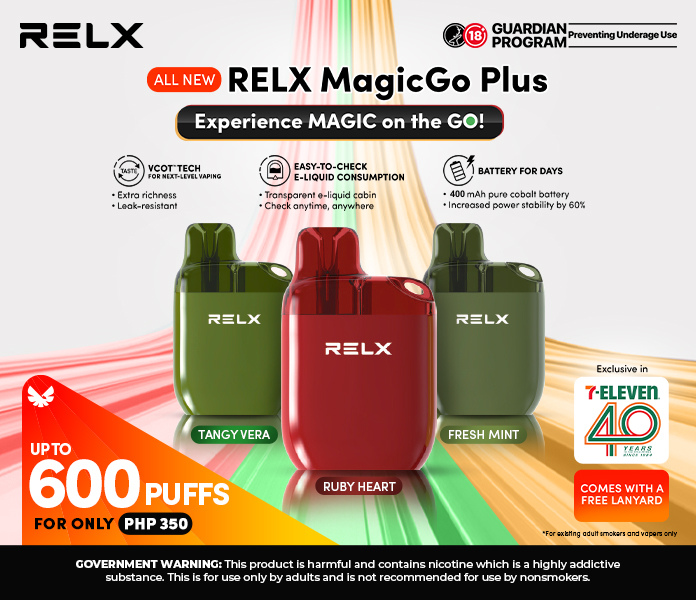
Introducing RELX MagicGo Plus on 7-ELEVEN, RELX's First Ever Disposable Device on the Go!
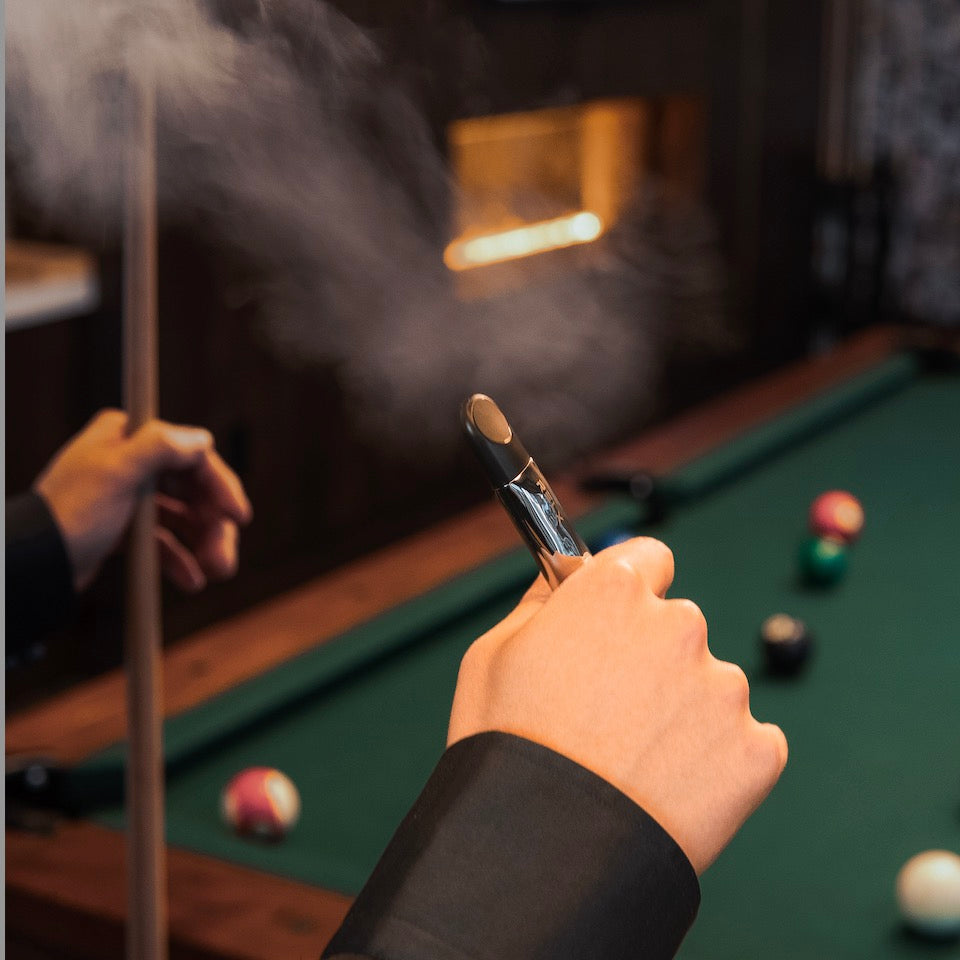
How to Spot Fake Vape? Essential for Safety

A Vaper's Handbook On How to Blow Smoke Rings
Are you looking to impress your friends with some unique party tricks? Well, look no further! We’re here to teach you how to blow smoke rings - a skill that will definitely turn heads and have everyone asking “How did you do that?!” Not only is it easy to learn, but also super satisfying once you finally master this fascinating technique. Let's get started and learn how to blow those perfect smoke circles!
Discover the art and technique of creating captivating smoke rings. Enhance your smoking experience with this comprehensive guide.




















